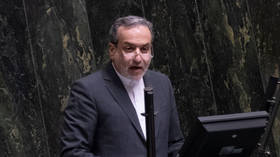Iran announces new nuclear move

Iran has made good on its pledge to expand its nuclear program in response to the International Atomic Energy Agency (IAEA) passing a resolution critical of the country. According to an announcement on Sunday by the speaker of the nation’s parliament, Mohammad Bagher Ghalibaf, Tehran has inaugurated new advanced centrifuges for nuclear enrichment.
The UN atomic watchdog passed the resolution at its board of governors meeting on Thursday. The motion denounced Iran’s lack of transparency on its nuclear activities. While China, Russia, and Burkina Faso voted against, it was passed with 19 votes in favor. There were 12 abstentions and Venezuela did not vote, according to AFP sources. In a joint statement ahead of time, the UK, France and Germany claimed Iran’s nuclear program posed a “threat” to international security. Washington also slammed its nuclear activities as “deeply troubling.”
Ghalibaf told parliament that the resolution reflects the West’s “politically unrealistic and destructive approach” toward Iran’s nuclear program. He accused countries like the US of using Iran’s nuclear activities as a pretext for their own “illegitimate actions” and said the motion they spearheaded jeopardized the IAEA’s credibility and independence.
“Their dishonesty and bad faith have disrupted the constructive atmosphere we were building for strengthened cooperation between Iran and the agency. These politically charged and nonconstructive decisions force countries to take measures outside the IAEA protocols to safeguard their national security,” Ghalibaf stated, before announcing that Tehran would deploy advanced centrifuge systems for uranium enrichment in response.
He urged IAEA member states to oppose the West’s influence on the agency and reiterated that international nuclear cooperation should be conducted in a nonpolitical framework.
Iran’s ambassador to the IAEA, Mohsen Naziri Asl, earlier called the IAEA resolution “politically motivated.”
The West has long claimed Iran’s uranium enrichment activities are a covert attempt to develop atomic weapons, despite Tehran’s insistence that its nuclear program is peaceful. The 2015 nuclear agreement between Iran and world powers put limits on the program in exchange for sanctions relief, but the deal collapsed after the US withdrew from it in 2018. Iran has since stepped up its enrichment capabilities, and according to IAEA Director General Rafael Grossi, is now close to the threshold required for weaponization.
Iranian Foreign Minister Abbas Araghchi warned Grossi during his visit to Tehran earlier this month that there would be a response if the IAEA board passed an anti-Iran resolution. According to Araghchi, Tehran is ready to renegotiate the 2015 agreement, but only if the West is willing to agree a new deal on mutually beneficial terms.













